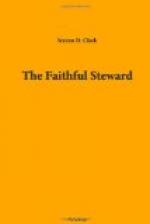But the capital of some makes returns only once a year; of others, only once in a series of years. To such this rule can be by no means applicable; for the wants and sufferings of those whom God has made it our duty to relieve, often demand far more frequent distributions; while, in a variety of instances, it calls into exercise our benevolence too rarely to suppress the selfish tendencies of the heart,—a point, which, in rearing a system of beneficence, may never be overlooked. Other principles must therefore be noticed.
2d. Our contributions should be so frequent as will tend to repress the selfish, and keep alive the benevolent affections. We should give so frequently as to impress and nurture the conviction that we were made not only for ourselves, but for others; and that the noblest use of property is its distribution to the needy. This conviction it is difficult to engender, and harder to keep alive, but it is best produced and quickened to energy by frequently engaging in the duties of charity. Benevolence, to become strong, must be cultivated; and it is so much of an exotic in the human breast, that it needs the most earnest and assiduous care; while selfishness, such is its strength and tenacity of life, can be deadened and kept in abeyance only by repeated and vigorous assaults. As a general rule, that system, as to frequency, should be chosen, which comes most strongly in collision, and wrestles most powerfully with the selfishness of the heart. Some, I know, would deal gently with this obnoxious principle; rather humor than goad it; and on this ground urge the importance of frequent, and, of course, small contributions, which will scarcely be felt; maintaining that on the whole a larger amount will be collected. But I would not urge frequency of donations on this account. I would advocate benevolence only on those principles which will give it life and vigor for eternity. The Bible says




